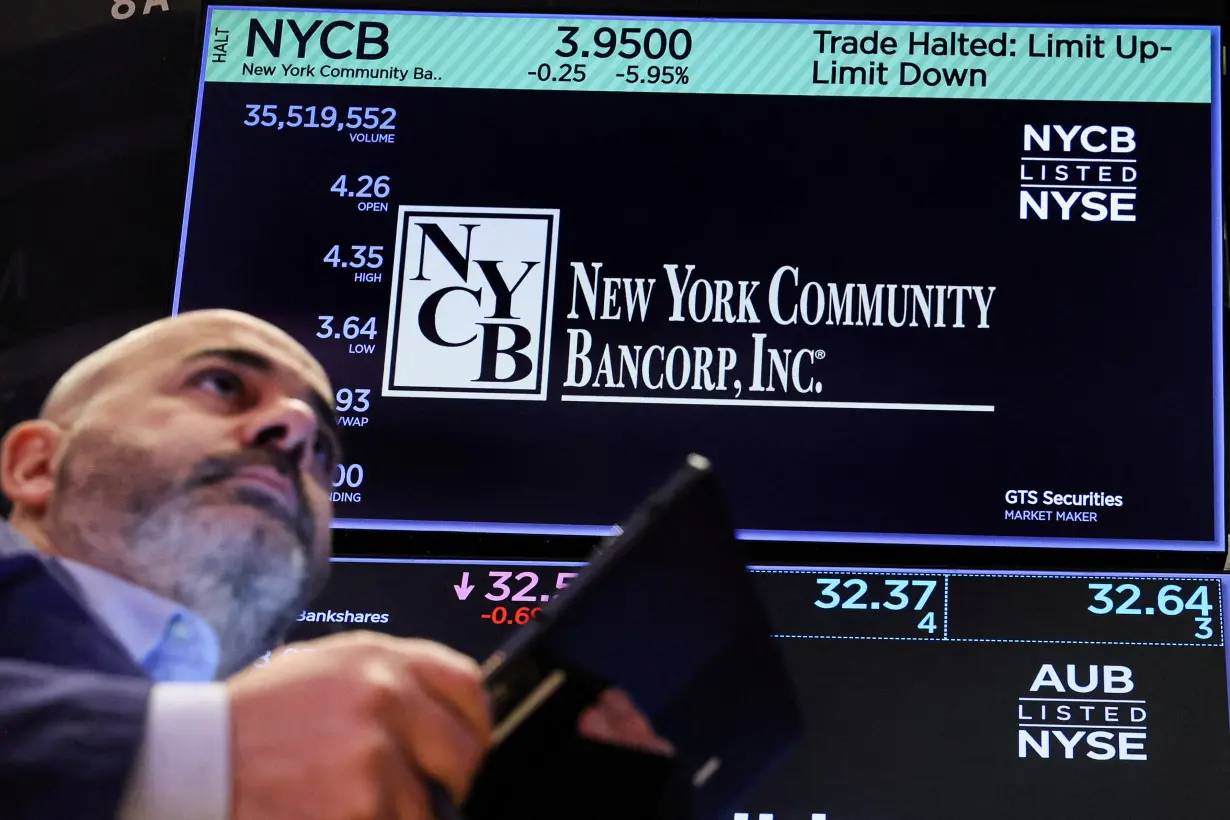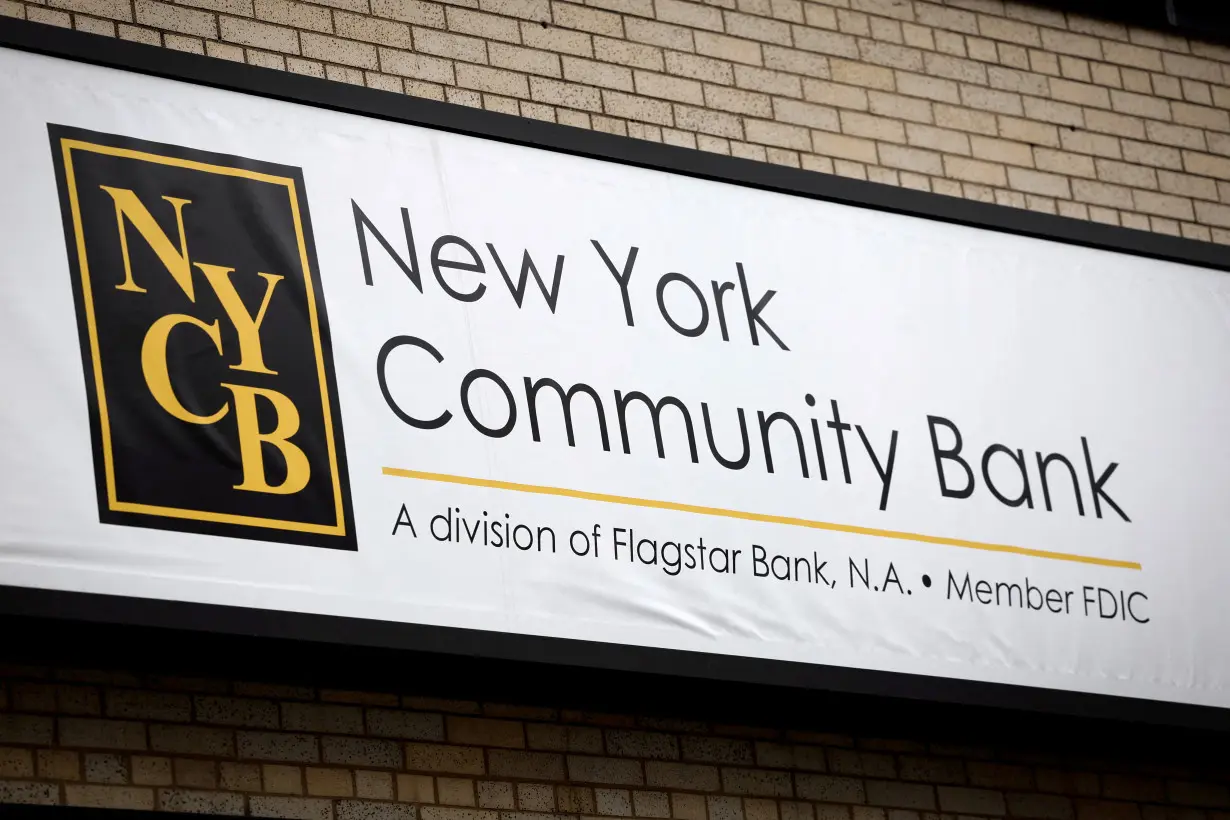By Carolina Mandl, Matt Tracy and Saeed Azhar
NEW YORK/WASHINGTON (Reuters) - New York Community Bancorp's exposure to commercial real estate has intensified investor scrutiny around regional banks, with some expecting more pain for those with office and multifamily property loans.
Fears about the health of the smaller banks have escalated again a year after the collapse of Silicon Valley Bank in spring of 2023 triggered a regional banking crisis.

NYCB's recent earnings release which sparked a dive of about 60% in its shares has particularly focused investors on combing through portfolios of regional banks, as small banks account for nearly 70% of all commercial real estate (CRE) loans outstanding, according to research from Apollo.
“As long as interest rates stay high, it's hard for the banks to avoid problems with CRE loans," said short-seller William C. Martin of Raging Capital Ventures, who decided to place a bet against NYCB after the bank's disastrous Jan. 30 earnings release which detailed real estate pain and led him to believe that shares could sink further on more real estate losses.
Martin, who shorted Silicon Valley Bank last year before its collapse, said he shorted NYCB because he thought its earnings power would be diminished and that it might have to raise capital. NYCB said on Wednesday that a capital increase is an option, but that it has no plan to do this "right at the moment."
The bank declined to comment on the short-seller's view.
"The regional banks ... (are) doubly more exposed to rates," said Dan Zwirn, co-founder and CEO of distressed debt investment firm Arena Investors, who is avoiding real estate for the next year or two, citing in part higher risk of default. The KBW Regional Banking index is down around 11% since NYCB's announcement.
The CRE market has been hit by the repercussions of the COVID-19 pandemic. Delinquency rates on commercial mortgage-backed securities (CMBS) are expected to rise to 8.1% in 2024, according to Fitch, as many companies struggle to convert remote and hybrid-working employees. Meanwhile CMBS loan delinquencies in commercial multifamily - housing properties with more than five units - are expected to touch 1.3% in 2024 versus 0.62% in 2023.
CRE has also faced pressure from higher interest rates where roughly $1.2 trillion in commercial mortgages are set to mature this year and next, Goldman Sachs research showed.
Some have also assigned greater risk to commercial multifamily assets in New York City.
Unique to NYCB is its role as a major lender to rent-stabilized landlords in New York City. More than half of its total multifamily loan portfolio is secured by properties in New York state, many of which are subject to rent regulation laws, the company has said. The default rate on New York’s rent-stabilized housing has historically been low, but has risen from 0.32% in April 2020 to 4.93% in December 2023, impacted by the pandemic and a 2019 law limiting landlords' ability to raise rents, said Stephen Buschbom, research director at real estate data provider Trepp.
As banks start taking up provisions for their New York property more broadly, “you could have a possible next wave of the crisis that began unfolding last year," said Nate Koppikar of Orso Partners, who is short banks that have outsized CRE exposure. He declined to elaborate.
HIGH CONCENTRATION
Some investors are focused on those banks with high concentration of real estate loans. Martin said he was also short OceanFirst, and had been short Valley National, but he closed his position this month after pocketing gains.
Both banks, as well as NYCB, have CRE holdings as a proportion of total risk-based capital above 300% according to data from Trepp. That level of 300% may indicate a lender is exposed to significant risk of CRE concentration, according to public guidelines from the Federal Deposit Insurance Corporation (FDIC). The FDIC did not respond to a request for comment.
Valley's CRE holdings as a proportion of its total risk-based capital was at 479% in the fourth quarter, while OceanFirst was at 447%, Trepp's data showed. As of the third quarter, NYCB had a ratio of 468%.
In total, nearly 1,900 banks with assets less than $100 billion had CRE loans outstanding greater than 300% of equity, according to Fitch.
Fitch, in a detailed report in December, also said if prices decline by approximately 40% on average, losses in CRE portfolios could result in the failure of a moderate number of predominately smaller banks.
OceanFirst told Reuters it has a "widely diversified portfolio" with very low levels of concentration in central business district office and rent-stabilized multifamily and said short selling interest in the stock is low.
NYCB did not immediately respond to a request for comment on the short selling and concentration risk. Valley's deputy CFO Travis Lan said the bank is "comfortable with our diverse and granular commercial real estate portfolio" and said the bank "prioritized balance sheet diversity."
LOAN SALES
Investors predict that some regional banks could be forced to sell loans at a loss or increase provisioning for losses. A distressed debt investor said that some regional banks with exposure to New York City's rent-stabilized multifamily loans have begun exploring sales of these and other assets.
NYCB said on Wednesday options could include loan sales and that the bank "will be razor-focused on reducing our CRE concentration."
But selling loans may not be an optimal solution with properties now valued 50%-75% below their valuations at the time loans were struck, said Rebel Cole, a finance professor at Florida Atlantic University.
"Loans that were done over the last five to seven years, a lot of those are challenged now," said Ran Eliasaf, founder and managing partner of real estate investment firm Northwind Group, who is investing in the New York multifamily market.
(Reporting by Carolina Mandl and Saeed Azhar in New York and Matt Tracy in Washington; Editing by Shankar Ramakrishnan, Megan Davies and Matthew Lewis)

 Trump has begun another trade war. Here's a timeline of how we got here
Trump has begun another trade war. Here's a timeline of how we got here
 Canada's leader laments lost friendship with US in town that sheltered stranded Americans after 9/11
Canada's leader laments lost friendship with US in town that sheltered stranded Americans after 9/11
 Chinese EV giant BYD's fourth-quarter profit leaps 73%
Chinese EV giant BYD's fourth-quarter profit leaps 73%
 You're an American in another land? Prepare to talk about the why and how of Trump 2.0
You're an American in another land? Prepare to talk about the why and how of Trump 2.0
 Chalk talk: Star power, top teams and No. 5 seeds headline the women's March Madness Sweet 16
Chalk talk: Star power, top teams and No. 5 seeds headline the women's March Madness Sweet 16
 Purdue returns to Sweet 16 with 76-62 win over McNeese in March Madness
Purdue returns to Sweet 16 with 76-62 win over McNeese in March Madness








